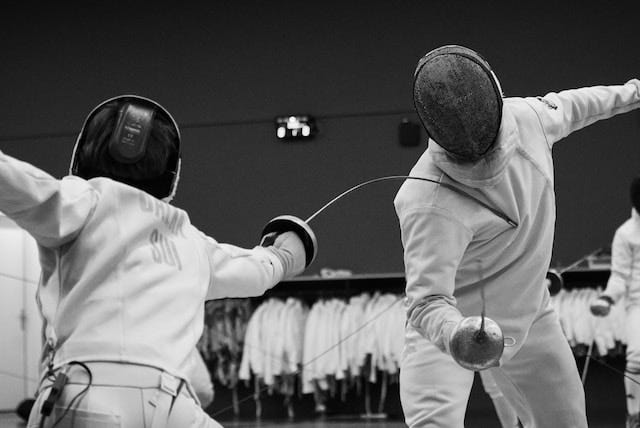Before You End Fencing Scholarships, Consider the Impact That Would Have on Major League Fencing
Where will the next generation of fencing superstars come from?

Affirmative action in college admissions has been struck down. Attention is now turning to the advantages enjoyed by the children of the rich and powerful. Legacy admissions and other “holistic” criteria have been criticized. Much of the anger has been directed towards scholarships for sports assumed to be played only by the wealthy, such as fencing.
I welcome this re-think of college admissions. More should be done to improve access. But we should be wary of the unintended effects of hastily considered policies. And, as a long-time professional fencer who cut his teeth on the college fencing circuit, I worry about the impact that a ban on fencing scholarships would have on Major League Fencing.
Fencing is America’s pastime. In my house growing up — as was the case in so many American houses of Luxembourgeois descent — weekends were for fencing. My dad would park himself in the East Wing drawing room, joined by his buddies Nils, Philippe, and Laufeyjarson — they all worked together at the Credit Suisse factory in town. Dad and his pals would crack open a few bottles of Chateauneuf-Du-Pape Vieilles Vignes, my mom would make patates Dauphinois, and Fencing Night in America was on. Out on the portico, my friends and I would wave sticks and embody our fencing heroes. “I’m Aladár Gerevich!”, I’d cry. “Well I’m Edoardo Mangiarotti!”, my friend would reply. It was a tableau as American as snails sautéed in Normande velouté.
Of course, this was a two-day ritual. Saturday was for college fencing; I grew up when the Vassar-Bryn Mawr rivalry was at its peak and the Mean Green Machine of William and Mary dominated the Colonial Conference. Sunday was for the pros: My dad was a die-hard Philippe Riboud fan, while my mom backed Björne Väggö, so…yeah, it was awkward! In fact, Dad was such a Riboud-head that he once mixed it up with some rowdy Éric Srecki fans at a vineyard. Only when Dad grabbed a stick and showed off some lightning-quick remises and riposts did the Sreckiacs back down.
Major League Fencing is more popular than ever. Last month, a repechage bout attracted a record three dozen people; the throng of fencing fans could barely fit in the Fern Room at the Providence Doubletree. Major endorsement deals have been signed with Enron and the Asparagus Growers of Curaçao. Could MLF be more popular than the NFL in a few years? Possibly. But this rapid growth and the hundreds of dollars of revenue that it generates will be threatened if college fencing scholarships are eliminated.
College fencing is pro fencing’s de facto development system. All of fencing’s present-day luminaries came through the college ranks (except, obviously, Ulrich Weissenborn, “the LeBron James of fencing”). Some say that fencing scholarships overwhelmingly go to children of privilege while adding little value to college life; I’d say that depends on your definition of “privilege”, “value”, “overwhelmingly”, “college”, “children”, “life”, and “from”. But I know this for certain: If we undermine Major League Fencing, then it will be a major blow to a lot of working class Józefs out there.
Major League Fencing needs college fencing. College fencing is about passion and tradition — the atmosphere around an Ameherst-Middlebury matchup is electric! — but the fencers themselves are still raw. If you’re looking for crisp coulés and biting counter-ripostes, you’ll find few on the college circuit. Promising fencers need time to develop; they may wilt if thrown directly into the pressure cooker of professional fencing. Plus, few 18 year-olds are emotionally ready for the glamour of the pro circuit. I remember when I turned pro — it was mind-blowing! The tens of fans, the autograph seeker (hi Phyllis!), the 15 percent discount at Supercuts — I was overwhelmed! Tossing a teenager into that environment without the preparation of college could cause them to spin out.
Fencing is not exclusively a sport for the wealthy. In college, I had a teammate whose summer home was barely big enough to house his majordomo. Another worked long hours at a side job as the Duchess of Lichtenstein. And at the pro level, Major League Fencing is broadening its appeal: Our "Foil Expectations!” program is cultivating fencing among inner-city youth. Already, we’ve seen big results: Last month, a group of teens lingered near our table at the South Bronx Boys & Girls Club for almost 20 minutes! We’re well on our way to our goal of getting one inner city youth to join our e-mail list by 2040.
America needs a college system that provides equal access to all. But we also need to quench America’s insatiable thirst for elite-level fencing. Without college fencing, the pro circuit would wither. We’d lose top fencers to leagues in Monaco and Andorra. We might lose our broadcast deal with Quibi. Promising fencers on the cusp of the pros would be forced to join Shakespearean theatre troupes just to get reps. Equal access is at the core of what it means to be American, but so is gathering around the tube on a Sunday to watch a mixed-doubles épée match. And ending college fencing scholarships would be a flèche straight to the plastron of professional fencing.






We cannot - we must not - allow our best fencers to be swallowed up by glamorous European micro-states!
Fencing is an easy target for these sorts of jabs. Aim higher.